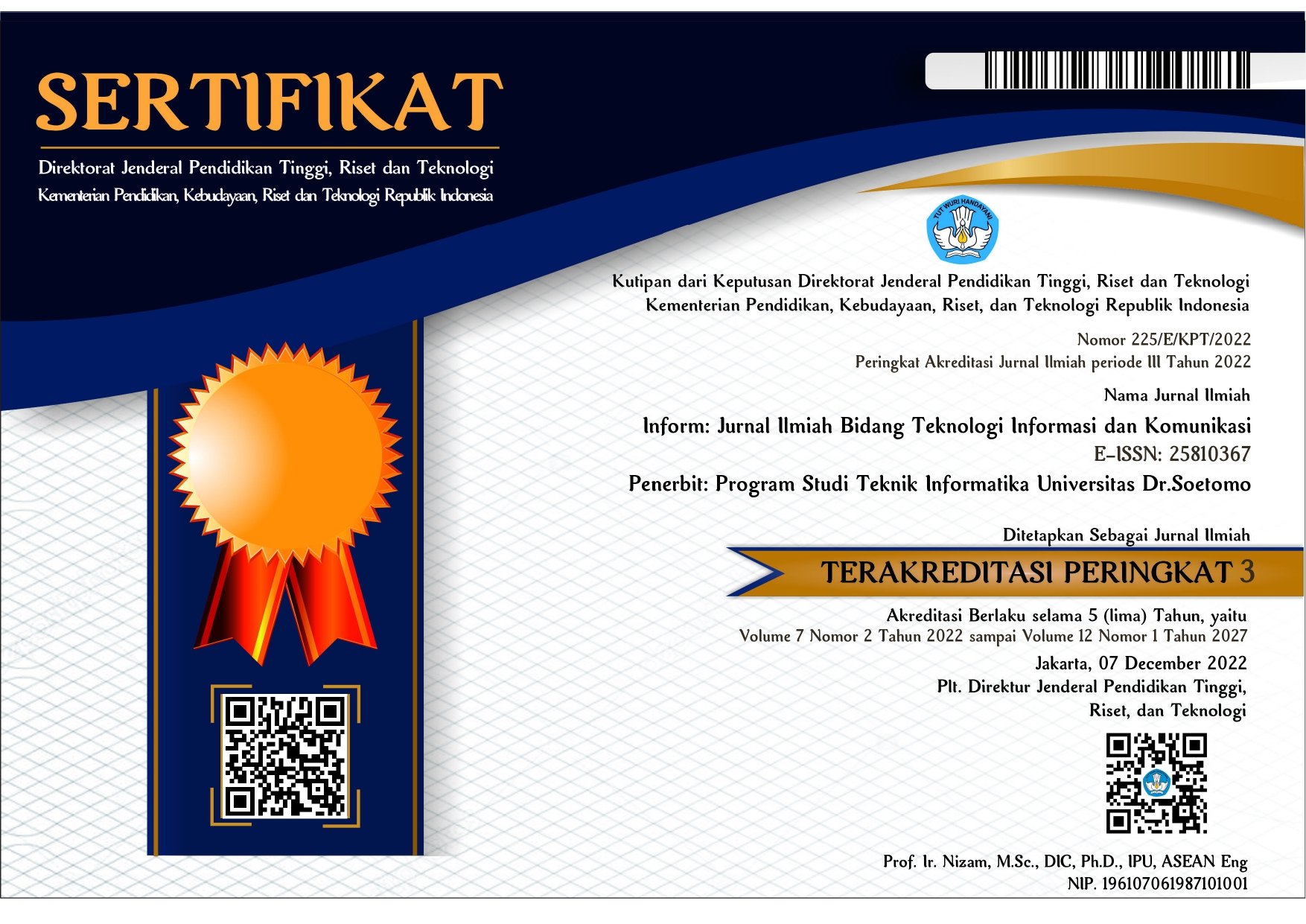Analysis Software Engineering Team's Soft Skills Learning using Online Learning Platform with Project-Oriented Problem-Based Learning (POPBL)
 Abstract views: 377
,
Abstract views: 377
,
 PDF downloads: 318
PDF downloads: 318
Abstract
In a decade, the 4.0 industry requires improving their employees, especially for freshly graduated employees. Both hard skills and soft skills must be improved. The Computers and Informatics Engineering Department at Bandung State Polytechnic has a software project subject in their curriculum that adapted the Project-Oriented Problem Based Learning (POPBL) method to improve them. It can give the skills experience that the industry needed, especially soft skills for students who act as the software engineering team in this subject. But, after the spread of covid-19, soft skills learning with POPBL must use the online learning platform. The POPBL must be designed with the online learning framework. Based on industrial needs, each student's soft skills are problem-solving, teamwork, responsibility, communication, hard work, and discipline. These two purposes of the research are making the POPBL using the online learning platform and knowing how to use the online learning platform in the POPBL method. The findings in this POPBL research are something happen in POPBL online learning, such as all step in POPBL framework keep running, poor connection and communication device to be a problem that hinders the POPBL process, need more time for lecturer to observe the students directly, and need more time to give the action from the weekly evaluation results. In addition, the impacts of POPBL online learning on soft skills results are founded. Means of the students' soft skills grades and Wilcoxon test are used to get the results of this research. The result of data analysis is four soft skills significantly change. Two of the soft skills significantly increased are responsibility and hard work. Problem solving and communication are decreased considerably. The conclusion is the spread of covid-19 given the impacts on students' soft skills in software project class at Bandung State Polytechnic using the POPBL online learning method.
References
V. Garousi, I. Researcher, C. Catal, and M. Felderer, "Closing The Gap Between Software Engineering Education and Industrial Needs," IEEE Softw., 2018.
K. A. Moore and B. J. Pearson, "Soft Skills in an Online Class," Horttechnology, vol. 27, no. 5, pp. 583–585, 2017.
S. Gibb, "Soft skills assessment : theory development and the research agenda," Int. J. Lifelong, no. October, pp. 37–41, 2014.
N. Ibrahim and S. A. Halim, "Generic Framework Design of Project-Oriented Problem-Based Learning ( POPBL ) for Software Engineering Courses," in 8th Malaysian Software Engineering Conference (MySEC), 2014, pp. 359–364.
G. Matturro, F. Raschetti, and C. Fontán, "Soft Skills in Software Development Teams A Survey of the Points of View of Team Leaders and Team Members," in IEEE/ACM 8th International Workshop on Cooperative and Human Aspects of Software Engineering, 2015.
K. P. Aničić and R. Mekovec, "Introducing Problem-Based Learning to Undergraduate IT Service Management Course : Student Satisfaction and Work Performance," J. Probl. Based Learn., vol. 4, no. 1, pp. 16–37, 2016.
D. N. A. Jawawi, N. Ibrahim, S. A. Halim, R. Mamat, and N. Mohamed, "Adaptation of Project-Oriented Problem-Based Framework for Teaching Computer Programming," 2017, pp. 844–849.
H. Tadjer, Y. Lafifi, H. Seridi-bouchelaghem, and S. Gülseçen, "Improving soft skills based on students' traces in problem-based learning environments," Interact. Learn. Environ., vol. 0, no. 0, pp. 1–18, 2020.
S. R. Wulan and S. D. Setiarini, “Penerimaan Pembelajar terhadap Penggunaan Scrimba sebagai Multimedia Pembelajaran Interaktif,” J. Pendidik. Multimed., vol. 3, no. 1, pp. 1–8, 2021.
A. Abidah, H. N. Hidaayatullaah, R. M. Simamora, D. Fehabutar, and L. Mutakinati, "The Impact of Covid-19 to Indonesian Education and Its Relation to the Philosophy of 'Merdeka Belajar ,’” Stud. Philos. Sci. Educ., vol. 1, no. 1, pp. 38–49, 2020.
M. Palacin-silva, J. Khakurel, A. Happonen, T. Hynninen, and J. Porras, “Infusing Design Thinking Into a Software Engineering Capstone Course,” in 30th IEEE Conference on Software Engineering Education and Training, 2017, pp. 212–221.
R. G. Utomo and Y. Rosmansyah, “Framework untuk Mendesain Sistem Massive Open Online Courses ( MOOCs ) untuk Universitas di Indonesia,” vol. 2, no. 2, pp. 65–74, 2020.
P. N. Bengkalis, “Persepsi Mahasiswa terhadap Pembelajaran Daring di Pendidikan Tinggi Vokasi : Studi Perbandingan antara Penggunaan Google Classroom dan Zoom Meeting,” Edukatif J. Ilmu Pendidik., vol. 3, no. 1, pp. 188–195, 2021.
Association of American Colleges and Universities, “Valid Assessment of Learning in Undergraduate Education,” 2007. [Online]. Available: https://www.aacu.org/value. [Accessed: 09-Nov-2020].
L. F. Capretz, “Soft Skills and Software Development : A Reflection from Software Industry Soft Skills and Software Development : A Reflection from Software Industry,” no. May 2013, 2014.
A. Riadin and M. Jailani, “Perbedaan Peningkatan Hasil Belajar Ekonomi dengan Menerapkan Model Cooperatif Tipe NHT (Numbered Head Together) dan Tipe IOC (Inside Outside Circle) pada Peserta Didik SMA Muhammadiyah 1 Palangkaraya,” Pedagog. J. Pendidik., vol. 14, no. 2, pp. 60–70, 2019.
Copyright (c) 2021 Siti Dwi Setiarini

This work is licensed under a Creative Commons Attribution-ShareAlike 4.0 International License.
Authors who publish with Inform: Jurnal Ilmiah Bidang Teknologi Informasi dan Komunikasi agree to the following terms:
-
Authors retain copyright and grant the journal right of first publication with the work simultaneously licensed under a Creative Commons Attribution License (CC BY-SA 4.0) that allows others to share the work with an acknowledgment of the work's authorship and initial publication in this journal.
-
Authors are able to enter into separate, additional contractual arrangements for the non-exclusive distribution of the journal's published version of the work (e.g., post it to an institutional repository or publish it in a book), with an acknowledgment of its initial publication in this journal.
-
Authors are permitted and encouraged to post their work online (e.g., in institutional repositories or on their website) prior to and during the submission process, as it can lead to productive exchanges, as well as earlier and greater citation of published work.













